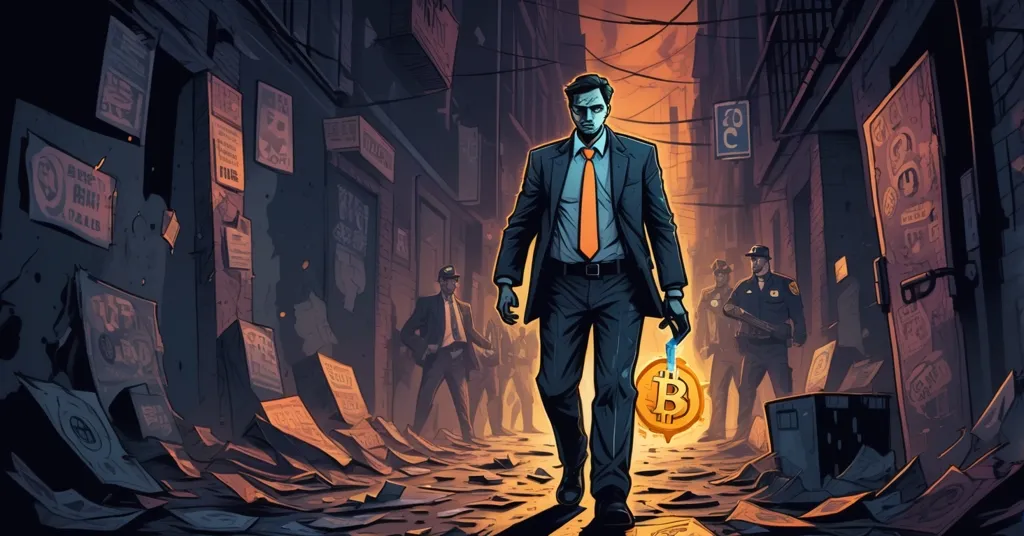NYPD Officers Linked to Brutal Bitcoin Kidnapping: Crypto Security Under Scrutiny

NYPD Officers Tied to Brutal Bitcoin Kidnapping: A Wake-Up Call for Crypto Security
A shocking betrayal of trust has rocked New York City, as two NYPD officers stand accused of aiding in a horrific Bitcoin kidnapping that left an Italian businessman scarred and the crypto community on edge. This case, unfolding in the heart of Manhattan, exposes the dangerous intersection of law enforcement ethics, cryptocurrency wealth, and violent crime.
- Two NYPD officers on modified duty over alleged role in Bitcoin kidnapping.
- Italian businessman tortured for weeks to access his crypto holdings.
- Incident fuels concerns over crypto security and police corruption.
The Nightmare in NoLIta: A Businessman’s Ordeal
On May 6, 2025, Michael Valentino Teofrasto Carturan, an Italian national with ties to the crypto world, arrived in New York City, lured under false pretenses by individuals he once trusted. What awaited him was pure horror. Held captive in a 17-room townhouse at 38 Prince Street in NoLIta—a trendy Manhattan neighborhood known for its chic vibe, not crime—Carturan endured nearly three weeks of torture. The perpetrators, identified as John Woeltz, William Duplessie, and a third suspect, Ms. Folchi, subjected him to beatings, electric shocks with a Taser, whippings with a firearm, and chilling threats against his family. Their goal? Forcing him to reveal the private keys to his Bitcoin wallet, a digital vault holding significant wealth.
Evidence uncovered at the luxury townhouse, listed for rent at a staggering $75,000 a month, paints a gruesome scene: photographs of torture, guns, a ballistic vest, and traces of blood. Carturan’s captivity ended on May 24, when, bloodied and barefoot, he seized a fleeting moment of distraction by his captors after reluctantly disclosing his Bitcoin password. Surveillance footage aired by NBC 4 captured his desperate, raw plea for help from a traffic officer—a haunting snapshot of a man broken by cruelty. Yet, even in escape, the damage to his psyche and the trust in those meant to protect lingers. For more details on this chilling case, see the report on NYPD officers allegedly involved in a crypto kidnapping.
The Accused: Badges and Bad Actors
The involvement of two NYPD officers in this crime stabs at the core of public faith. One, a veteran with nearly 20 years on the force, reportedly drove Carturan from the airport straight into the jaws of his nightmare. The other, shockingly, was part of Mayor Eric Adams’ personal security detail—a role demanding the highest integrity. Both were allegedly moonlighting as off-duty security for the kidnappers, a side gig that raises immediate red flags about oversight and ethics. Did they have departmental approval for this work? Early reports suggest not, pointing to a brazen misuse of authority for what could only be financial gain or worse, coercion. Learn more about the officers’ involvement in this shocking SoHo kidnapping case.
Mayor Adams’ office didn’t hold back in condemning the allegations, swiftly placing the officers on modified duty—a status often meaning desk work or restricted roles while investigations unfold.
“Every city employee is expected to follow the law, including our officers, both on and off duty. We are disturbed by these allegations, and as soon as it came to our attention, the officers were placed on modified duty.” – Statement from Mayor Eric Adams’ office
The alleged orchestrators, Woeltz and Duplessie, bring their own baggage to this twisted tale. Woeltz, hailing from Paducah, Kentucky, dabbled in Silicon Valley startups, per a 2020 report from The Paducah Sun. A relative, speaking to The New York Post, painted a conflicting picture, suggesting he may have been a pawn in a larger game. For background on the suspects, check out the details on John Woeltz and William Duplessie’s prior records.
“He’s a kind, caring, loving person, so he was completely controlled by other people.” – A relative of John Woeltz
Duplessie, meanwhile, co-founded Pangea Blockchain Fund, now in liquidation, and carries a trail of financial chaos—lawsuits over unpaid luxury car leases, rent disputes, and traffic violations in Miami. His lawyer, Sanford Talkin, argued during arraignment that the facts of his involvement are “hotly disputed,” signaling a messy legal fight ahead. As for Ms. Folchi, her role remains murky, with no successful contact to her legal representation reported yet. Carturan’s prior business ties with Woeltz through a crypto hedge fund, which soured over financial disputes, likely made him a prime target—a stark reminder that personal connections can turn predatory in the high-stakes crypto game.
Crypto’s Ugly Shadow: The Rise of Wrench Attacks
This isn’t just a isolated horror story; it’s a glaring symptom of a growing scourge in the crypto space known as “wrench attacks.” These are vicious crimes where attackers use physical force—often torture—to extract private keys or passwords from victims, bypassing digital safeguards with old-school brutality. Turns out, the biggest threat to your Bitcoin might not be a hacker in a basement, but a thug with a toolbox. Globally, such incidents are spiking. In France, a crypto influencer’s father was kidnapped, and earlier in 2025, a cryptocurrency company founder was mutilated in a similar extortion plot, as reported by The New York Times and French media. These cases highlight a brutal reality: while blockchain tech offers financial freedom, it also paints a target on those who hold significant digital wealth. Explore more on the rise of such crimes in this overview of Bitcoin kidnapping trends and analysis.
For the uninitiated, Bitcoin operates on a public record system called the blockchain, which logs all transactions openly but shields user identities behind coded addresses. Owning Bitcoin means holding private keys—think of them as digital passwords—that unlock your funds. These can be stored in “hot wallets” (online, convenient but hackable) or “cold storage” (offline devices like USB drives, safer from digital threats but useless against a literal wrench to the knees). Carturan’s ordeal shows that no firewall or encryption can protect against human vulnerability. This is why operational security, or OpSec—protecting your personal info and assets—is non-negotiable for crypto holders. For historical context on high-profile kidnapping cases tied to wealth, see this Wikipedia entry on notable abductions.
Bitcoin Security: Hard Lessons and Practical Steps
So, how do you keep your Bitcoin safe from such nightmares? First, never flaunt your crypto wealth—bragging online or in business circles is like waving a red flag to predators. Use cold storage solutions like hardware wallets from brands such as Ledger or Trezor, which keep your private keys offline. Better yet, set up multi-signature wallets—think of them as needing two or more keys to open a safe, so even if one is compromised under duress, your funds remain locked. Some savvy users even create decoy wallets with small amounts to hand over in worst-case scenarios, buying time to escape. For practical tips, check out this discussion on protecting Bitcoin from theft.
Privacy is your best defense. Avoid linking your real identity to your crypto holdings, and be cautious about who knows your involvement in the space. Physical security matters too—invest in personal safety measures if you’re holding significant assets. Carturan’s case is a gut punch, showing that while Bitcoin empowers individuals against centralized overreach, it can’t shield you from human malice. We must adapt, not retreat. Read more about preventing such attacks in this piece on crypto security and wrench attack defense.
Broader Fallout: Trust, Corruption, and Regulation
The implications of NYPD officers allegedly moonlighting for criminals are nothing short of staggering. This isn’t just a crypto crime; it’s a crisis of trust in the very institutions meant to safeguard us. How many other officers might be dipping into murky waters with off-duty gigs? The NYPD has faced scrutiny for past scandals, from ticket-fixing schemes to excessive force claims, but involvement in a violent extortion plot—especially by someone on the mayor’s security detail—hits a new low. Current policies on off-duty work appear lax, with no clear mandate for mandatory disclosure or vetting of secondary employment in high-risk sectors. If proven guilty, these officers aren’t protectors; they’re predators in uniform, and that kind of garbage demands accountability, not excuses. Dive into community reactions on NYPD officers and crypto crime discussions.
Zooming out, this incident fuels a dangerous narrative for regulators itching to clamp down on crypto. Governments worldwide, from the EU with its MiCA framework to the US with tightening tax rules, often point to crime as justification for heavy-handed oversight. Cases like this hand them ammunition to push for measures—think mandatory reporting of large holdings or centralized custody—that threaten the decentralization we cherish. Sure, there’s an argument for some guardrails; perhaps anonymized alerts for high-value targets could deter attacks without exposing identities. But let’s be real: it’s a slippery slope to surveillance and control, undermining Bitcoin’s core promise. Community-driven solutions, like better education on OpSec and peer-to-peer security tools, are the way forward, not top-down edicts. For deeper insight into systemic issues, read about NYPD corruption tied to cryptocurrency crimes.
As a Bitcoin maximalist, I’ll always argue that BTC’s simplicity and resilience make it king—a middle finger to corrupt systems and a beacon of individual sovereignty. Yet, I can’t ignore that other blockchains, like Ethereum with its smart contracts, are experimenting with decentralized identity protocols that might one day bolster security against such crimes. Innovation across the space matters, even if Bitcoin remains the heart of this financial revolution. We can’t slow down progress just because bad apples exploit it—full speed ahead, eyes wide open, as the effective accelerationism crowd would say.
Key Takeaways and Burning Questions
- Why would NYPD officers allegedly aid in a Bitcoin kidnapping?
Financial incentives or coercion likely played a role, especially with off-duty work promising big payouts. Investigations must uncover if they were willing accomplices or manipulated into complicity. - How did the kidnappers target Carturan for his crypto wealth?
Prior business ties, particularly with Woeltz through a failed crypto hedge fund, gave the perpetrators insider knowledge of his Bitcoin holdings, marking him as a vulnerable target for extortion. - What does this mean for trust in law enforcement within the crypto space?
It’s a brutal blow, exposing potential corruption and the urgent need for stricter oversight of off-duty officer activities, especially in high-risk sectors like cryptocurrency where wealth attracts crime. - How can Bitcoin holders shield themselves from wrench attacks?
Strict OpSec is key—keep holdings private, use cold storage devices like Ledger, and set up multi-signature wallets. Physical security and avoiding public disclosure of crypto wealth are equally critical. - Could this spark harsher crypto regulations or NYPD reforms?
Absolutely. It may justify tighter controls on digital assets under the guise of crime prevention, while also pushing for policies on off-duty officer gigs to prevent future breaches of public trust.
Staying Vigilant in the Decentralized Revolution
The crypto community faces a stark challenge: balancing the ethos of decentralization against the grim threats posed by bad actors, whether they wear a badge or wield a weapon. Carturan’s torment is a harsh wake-up call that while Bitcoin and blockchain tech are game-changers, they exist in a world riddled with human flaws. For every leap forward in disrupting outdated systems, there’s a shadow ready to exploit it. Our mission isn’t just to innovate; it’s to stay sharp, call out the rot when we see it, and keep forging a future where freedom doesn’t come at the cost of safety. How far are we willing to push for both liberty and security in this untamed frontier?



